On September 20th, the 7th CCF was opened in Shenzhen. After the opening ceremony, the “Show Determination of a Great Power and Secure a Decisive Victory in Battle Against Poverty in 2020” International Public Welfare Seminar was held. Vice Minister of Civil Affairs Wang Aiwen, Deputy Secretary of Guangdong Party Committee and Municipal Party Secretary of Shenzhen Wang Weizhong, Vice-Chairman of ACFIC (All-China Federation of Industry and Commerce) Xie Jingrong, Deputy Party Secretary and Mayor of Shenzhen Chen Rugui, Deputy Director of the State Council Poverty Alleviation Office Hong Tianyun, Deputy Secretary-General of SASAC (State-owned Assets Supervision and Administration Commission of the State Council) Zhuang Shuxin, Vice President of the Red Cross Society of China Sun Shuopeng, Director of Guangdong Department of Civil Affairs Zhuo Zhiqiang, Vice-Chairman and Secretary-General of CCA (China Charity Alliance) Liu Fuqing, etc. attended the seminar. Huangmin, Deputy Mayor of Shenzhen conducted the seminar.
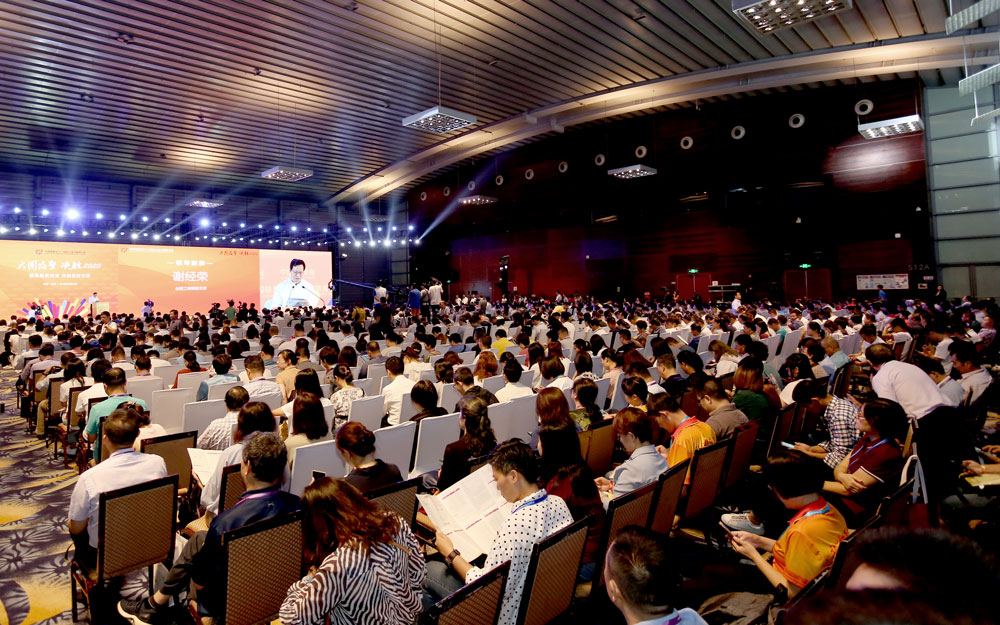
△Scene at the 2019 International Public Welfare Seminar (Photo)
Wang Aiwen, Vice Minister of Civil Affairs, said in his speech that China’s poverty alleviation has entered the home stretch, and it requires joint efforts from the party committees, governments and all sectors of society, as well as extensive participation of charity forces. He called on all charity forces to stay true to the mission, learn and implement General Secretary Xi Jinping’s important discourses in poverty alleviation, and pool our strengths to win a decisive victory in the battle against poverty. He wished civil affairs departments of all levels and the vast charity forces to embrace responsibilities with passion and amplify charity’s roles in poverty alleviation. Vice Minister requested us to sum up and perfect effective poverty alleviation modes based on China’s vibrant practices, and adhere to the chose direction of charity development with Chinese characteristics.
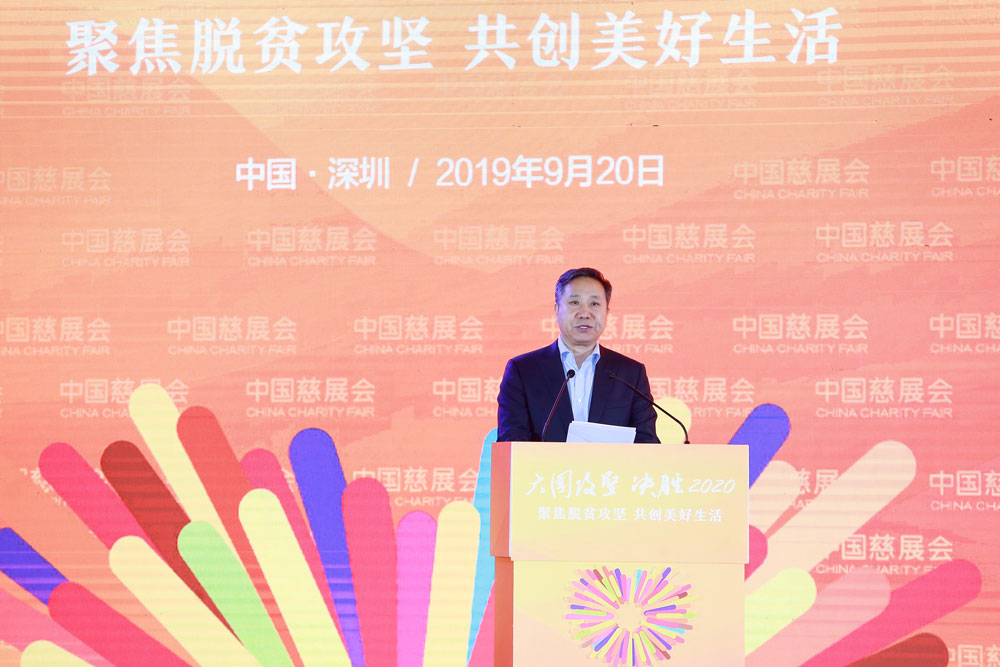
△Wang Aiwen, Vice Minister of Civil Affairs, delivered a speech (Photo)
In his speech, Xie Jingrong, Vice-Chairman of ACFIC (All-China Federation of Industry and Commerce), mainly introduced the implementation of the “Ten Thousand Enterprises Helping Ten Thousand Villages” poverty alleviation program. By the end of June this year, a total of 88,100 private enterprises have entered the ledger of targeted poverty alleviation and provided targeted assistance to 102,700 villages, including 55,300 registered poor villages and 11.63 million registered poverty-stricken population. Since 2017, ACFIC has organized China Guangcai Programs to Liangshan, Nujiang, Ningxia, South Xinjiang, Boutique Poverty Alleviation Program to Tibet and Private Enterprise Poverty Alleviation Program to South Xinjiang. It finalized over 500 projects worth 307 billion Yuan and donations totaling 515 million Yuan. The “Ten Thousand Enterprises Helping Ten Thousand Villages” program focused on poverty alleviation through industrial development and insisted on combining poverty alleviation and ambition boosting. By providing trainings, it improved poor population’s skills, and boosted their ability and motivation for self-development. The programs invested 75.3 billion Yuan and helped 6.28 million people.
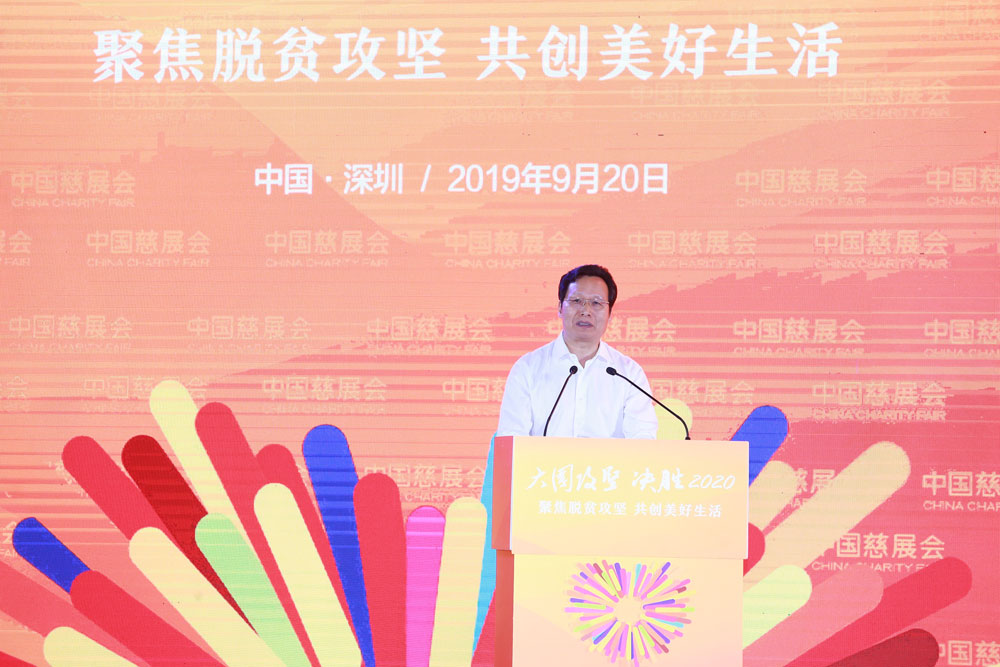
Xie Jingrong, Vice-Chairman of All-China Federation of Industry and Commerce, delivered a speech (Photo)
Deputy Party Secretary and Mayor of Shenzhen Chen Rugui said in his speech that Shenzhen is a city of love, a city of charity, a city of public welfare and a city of volunteers, it stays grateful in its reform and opening-up, and actively pays back our country by performing solids works in helping 9 provinces, cities and counties. In the past three years, Shenzhen allocated 24 billion Yuan of budget and raised 16 billion Yuan of social charity funds to assist over ten million people in various straitened circumstances. Recently, the Central Party Committee and the State Council issued the Opinion on Supporting Shenzhen’s Construction of a Pioneering Demonstration Zone of Socialism with Chinese Characteristics, Shenzhen will employ the platform function of CCF and show its demonstration and leading role in public charity, striving to make greater contribution to the construction of a moderately well-off society in an all-round way.
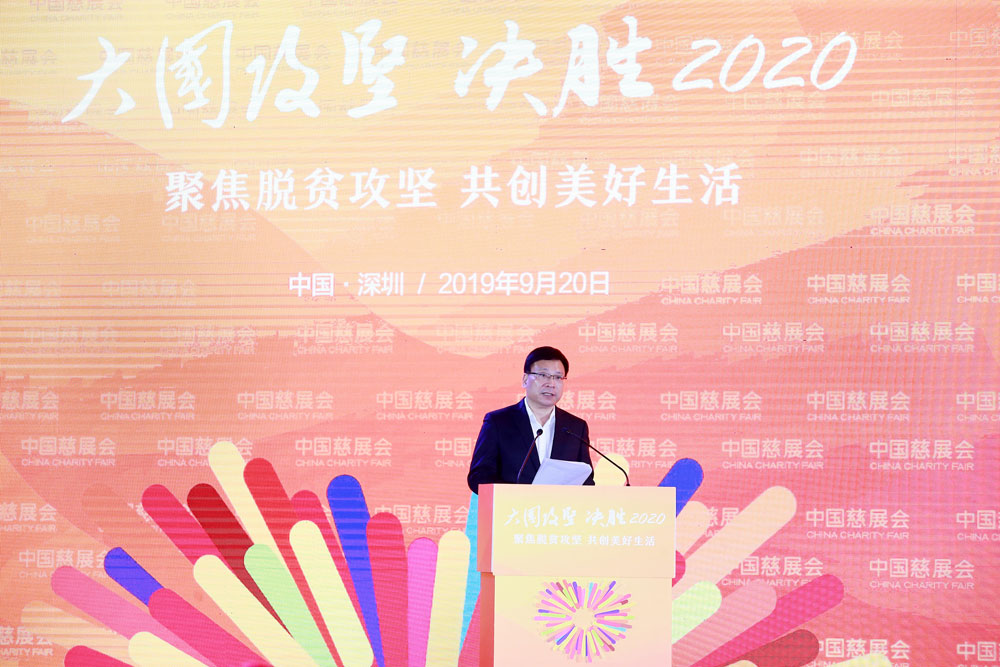
△Chen Ruigui, Deputy Party Secretary and Mayor of Shenzhen, delivered a speech (Photo)
Hong Tianyun, Deputy Director of the State Council Poverty Alleviation Office, pointed out in his speech that since the Party’s 18th National Congress, significant progress has been made in poverty alleviation. The poverty-stricken rural population under current national standards has decreased from 98.9 million to 16.6 million in 2018, and the poverty incidence fell from 10.2% to 1.7% at the end of 2018. 102,000 out of 128,000 poverty-stricken villages withdrew from the list. A large number of social organizations are actively participating in poverty alleviation. According to incomplete statistics, there are 686 formally established social organizations to carry out poverty alleviation in China. The total expenditure of poverty alleviation projects launched in 2018 was 32.3 billion Yuan, benefiting 630,000 households and 5.81 million people.
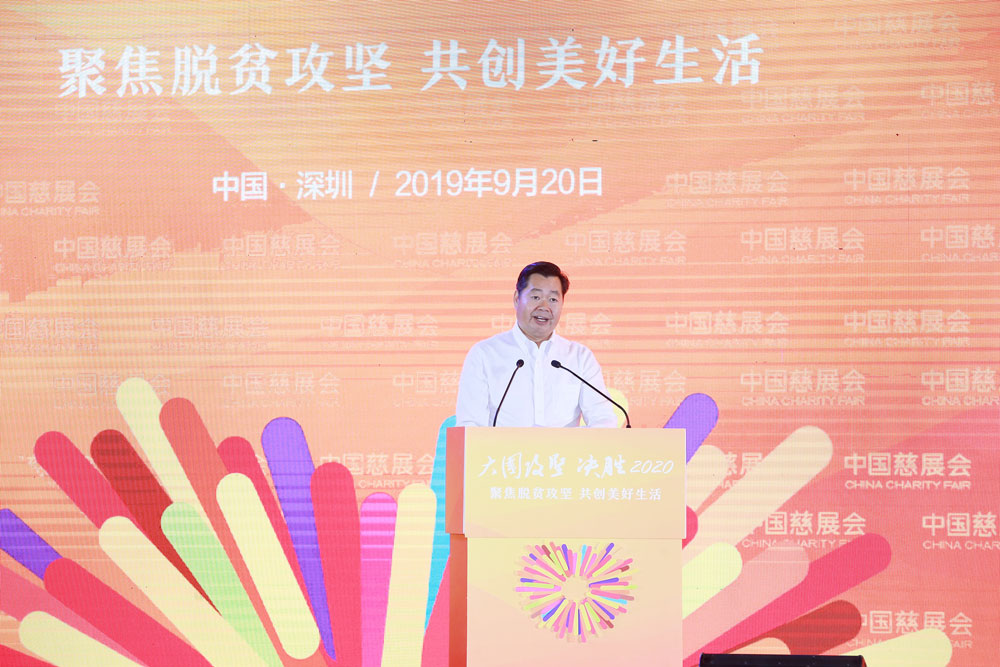
△Hong Tianyun, Deputy Director of the State Council Poverty Alleviation Office, delivered a speech (Photo)
Zhuang Shuxin, Deputy Secretary-General of State-owned Assets Supervision and Administration Commission of the State Council, said in his speech that the central enterprises continue to increase their intensity in poverty alleviation and have provided assistance to 276 national-level poverty-stricken countries, and paired up 27 counties in Tibet and 16 counties in the Tibetan areas in Qinghai. As of today, 107 counties have gotten rid of the title of national-level poverty-stricken counties. Besides, central enterprises also undertook various assistance and helping tasks arranged by local Party Committees, governments and industry administrations. In 2018 alone, central enterprises granted 5.8 billion Yuan of free poverty alleviation funds and attracted 1.8 billion Yuan of assistance funds to help 910,000 poverty-stricken households to get out of poverty. Additionally, since its establishment in 2016, the Central Enterprise Industry Investment Fund in Poverty-stricken Areas has accumulated a total investment of 21.5 billion Yuan.
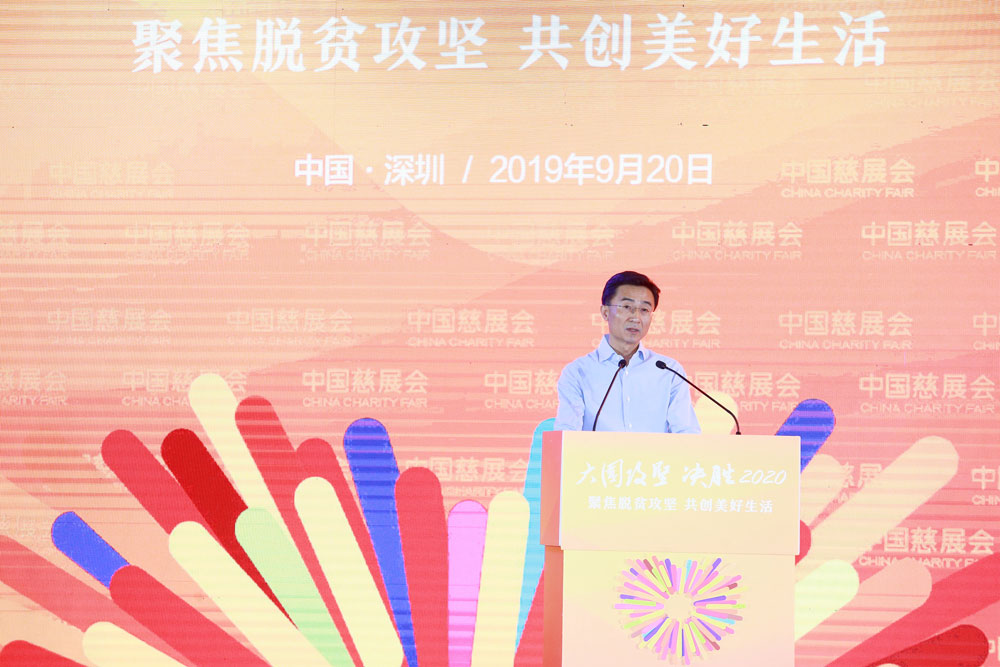
△Zhuang Shuxin, Deputy Secretary-General of State-owned Assets Supervision and Administration Commission of the State Council, delivered a speech (Photo)
In his speech, Sun Shuopeng, Vice President of the Red Cross Society of China, stated that in the past five years, the Red Cross Society of China has provided assistance to 28 provinces and more than 3,000 poverty-stricken villages in China. Through petty loans, targeted assistance, rolling operation and work-hard-to-get-rich models, the Red Cross Society of China helped over 2.3 million people to get out of poverty. In terms of poverty alleviation through health promotion, the Red Cross Society of China raised a total of more than 2 billion Yuan to provide humanitarian assistance for 2.71 million patients with major illnesses and critically ill patients, and assisted the construction of philanthropist health stations in more than 2,500 villages to continue promoting rural health.
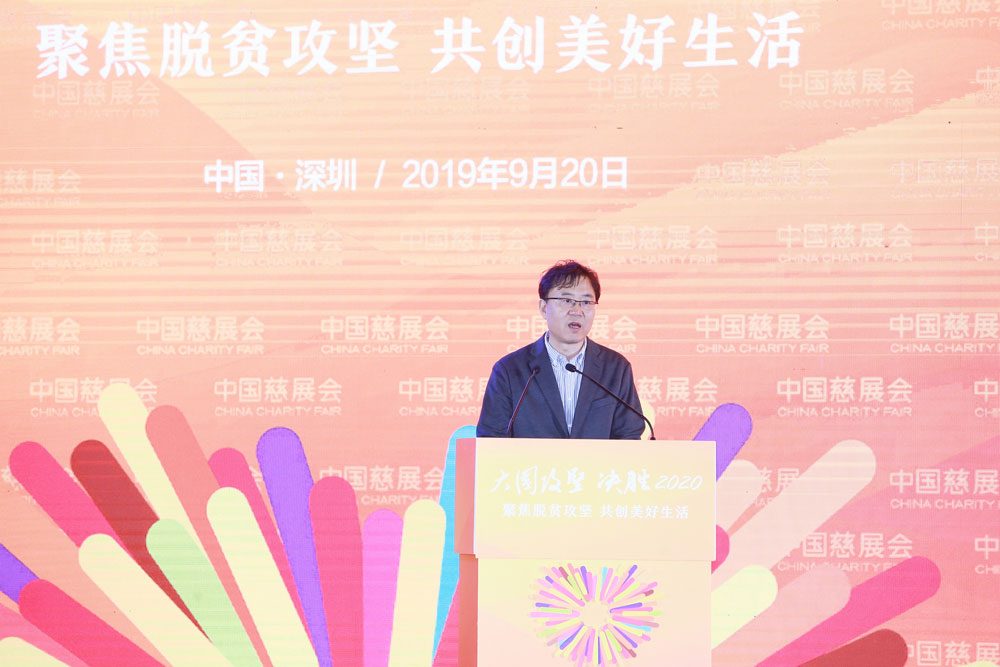
△Sun Shuopeng, Vice President of the Red Cross Society of China, delivered a speech (Photo)
This Seminar focused on three themes, namely “Joint sharing of global poverty reduction experience”, “Sustainable development in poverty-stricken areas” and “Building a new pattern for rural revitalization”. Participating speakers delivered speeches on respective themes to show the innovative practices of cross-industry charity forces in key topics of sustainable development such as promotion of poverty alleviation, scientific and technological innovations, environmental protection, education and medical fields.
Experts and scholars, including Ma Weihua, Yang Lan, Wang Zhenyao, Dang Yanbao, Soichiro Fukutake, Dong Fangjun, Wang Duanzheng, Ma Li, Zhang Yanzhen, Tang Min and Liao Ling, delivered keynote speeches.
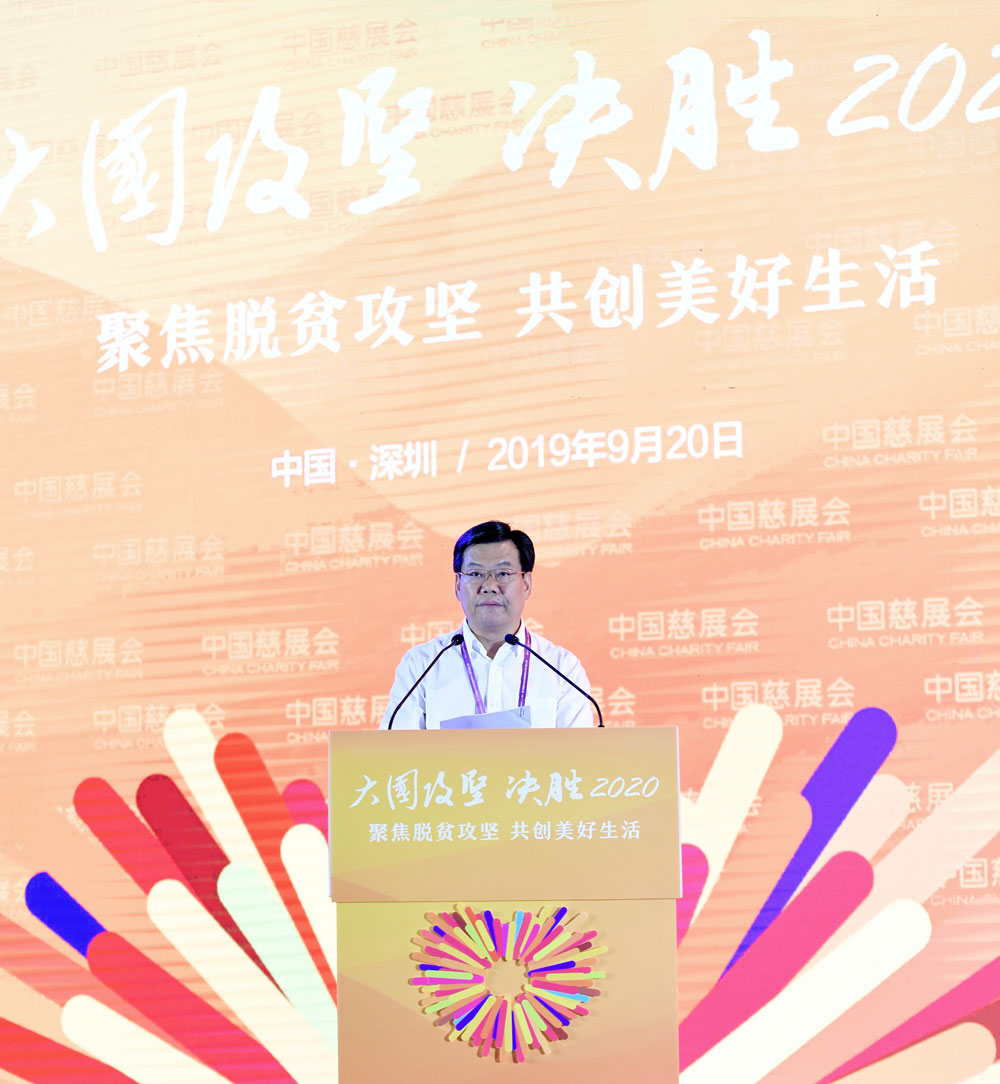
△Deputy Mayor of Shenzhen Huangmin conducted the seminar (Photo)